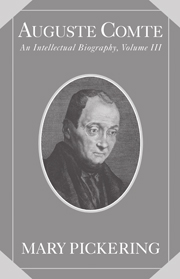Book contents
- Frontmatter
- Contents
- Acknowledgments
- Abbreviations and Notes
- Introduction
- 1 The Coup d'Etat and Its Consequences
- 2 Comte's Stumblings
- 3 The Vicissitudes of Positivism during the Early Empire
- 4 Système de politique positive: Natural and Social Philosophy
- 5 Système de politique positive: Comte's Philosophy of History
- 6 Système de politique positive: Comte's Utopia
- 7 The Last Years: Politics and Propaganda
- 8 The Last Flurry of Activity: The Testament and Synthèse subjective
- 9 The Death of the Great Priest of Humanity and His Influence
- Conclusion
- Bibliography
- Index
- References
3 - The Vicissitudes of Positivism during the Early Empire
Published online by Cambridge University Press: 06 January 2010
- Frontmatter
- Contents
- Acknowledgments
- Abbreviations and Notes
- Introduction
- 1 The Coup d'Etat and Its Consequences
- 2 Comte's Stumblings
- 3 The Vicissitudes of Positivism during the Early Empire
- 4 Système de politique positive: Natural and Social Philosophy
- 5 Système de politique positive: Comte's Philosophy of History
- 6 Système de politique positive: Comte's Utopia
- 7 The Last Years: Politics and Propaganda
- 8 The Last Flurry of Activity: The Testament and Synthèse subjective
- 9 The Death of the Great Priest of Humanity and His Influence
- Conclusion
- Bibliography
- Index
- References
Summary
A single dissidence suffices for the mind to render sterile the greatest conformity of opinions, whereas the heart easily overcomes serious divergences because of the existence of a similar sentiment pushing toward a common goal.
Comte, “Deuxième Circulaire annuelle,” March 24, 1851NEW DISCIPLES DURING THE EMPIRE
Under the Empire, the Positivist Society suffered from defections and slow growth. Meetings were dull because only Comte spoke for fear of being contradicted. Robinet and Magnin, who were among Comte's most loyal disciples, were adversaries of the Empire and tried to be diplomatic. No one felt free to discuss anything. Dr. René Cousin and Lefort were the only new members in 1852. There were two new members in 1853, one in 1854, three in 1855, and one in 1856. The new members under the Empire came from all walks of life, from professions such as law and medicine to the artisanal workforce. But it would be a mistake to judge the success of positivism solely by the membership of the Positivist Society. Positivism continued to attract numerous sympathizers with various degrees of adherence to all its principles. Indeed, the number of contributors to the Positivist Subsidy began to rise. Its subscribers included some workers, who after laboring for fifteen to sixteen hours a day, had barely enough money to feed their own families. A few women also gave to the Subsidy.
- Type
- Chapter
- Information
- Auguste ComteAn Intellectual Biography, pp. 96 - 158Publisher: Cambridge University PressPrint publication year: 2009

